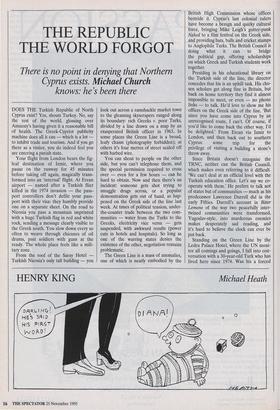THE REPUBLIC THE WORLD FORGOT
There is no point in denying that Northern
Cyprus exists. Michael Church
knows: he's been there
DOES THE Turkish Republic of North Cyprus exist? Yes, shouts Turkey. No, say the rest of the world, glossing over Amnesty's having given it a reasonable bill of health. The Greek-Cypriot publicity machine does all it can — which is a lot to inhibit trade and tourism. And if you go there as a visitor, you do indeed feel you are entering a pariah state.
Your flight from London bears the fig- leaf destination of Izmir, where you pause on the runway for 45 minutes before taking off again, magically trans- formed into an 'internal' flight. At Ercan airport — named after a Turkish flier killed in the 1974 invasion — the pass- port controllers don't defile your pass- port with their visa: they humbly provide one on a separate sheet. On the road to Nicosia you pass a mountain imprinted with a huge Turkish flag in red and white rock, sending a message clearly visible to the Greek south. You slow down every so often to weave through chicanes of oil drums, past soldiers with guns at the ready. The whole place feels like a mili- tary zone.
From the roof of the Saray Hotel Turkish Nicosia's only tall building — you look out across a ramshackle market town to the gleaming skyscrapers ranged along its boundary: rich Greeks v. poor Turks, divided by a line drawn on a map by an exasperated British officer in 1963., In some places the Green Line is a broad, leafy chasm (photography forbidden); at others it's four metres of street sealed off with barbed wire.
You can shout to people on the other side, but you can't telephone them, and the special permission required to cross over — even for a few hours — can be hard to obtain. Now and then there's an incident: someone gets shot trying to smuggle drugs across, or a popular demonstration gets out of hand, as hap- pened on the Greek side of the line last week. At times of political tension, under- the-counter trade between the two com- munities — water from the Turks to the Greeks, electricity vice versa — gets suspended, with awkward results (power cuts in hotels and hospitals). So long as one of the warring states denies the existence of the other, negotiation remains problematic.
The Green Line is a mass of anomalies, one of which is neatly embodied by the British High Commission whose offices bestride it. Cyprus's last colonial rulers have become a benign and quirky cultural force, bringing Mike Leigh's gutter-punk Naked to a film festival on the Greek side, and providing bats, balls and cricket stumps to Anglophile Turks. The British Council is doing what it can to bridge the political gap, offering scholarships on which Greek and Turkish students work together.
Presiding in his educational library on the Turkish side of the line, the director concedes that his is an uphill task. His cho- sen scholars get along fine in Britain, but back on home territory they find it almost impossible to meet, or even — no phone links — to talk. He'd love to show me his offices on the Greek side of the line. 'But since you have come into Cyprus by an unrecognised route, I can't. Of course, if you'd like to come back the other way, I'd be delighted.' From Ercan via Izmir to London, and then back out to southern Cyprus: some trip for the privilege of visiting a building a stone's throw away.
Since Britain doesn't recognise the TRNC, neither can the British Council, which makes even referring to it difficult. `We can't deal at an official level with the Turkish education office. Let's say we co- operate with them.' He prefers to talk not of states but of communities — much as his predecessor Lawrence Durrell did in the early Fifties. Durrell's account in Bitter Lemons of the way two peacefully inter- twined communities were transformed, Yugoslav-style, into murderous enemies makes desperately sad reading, and it's hard to believe the clock can ever be put back.
Standing on the Green Line by the Ledra Palace Hotel, where the UN moni- tor all comings and goings, I fall into con- versation with a 30-year-old Turk who has lived here since 1974. Was his a forced arrival? had to run ten miles with my mother to the nearest British base, with Eoka bullets flying round us. My mother was hit in the head, and has never been the same since. My father and elder brother stayed behind to defend the vil- lage.' He hasn't seen his family home since, and is content that things should be so. 'For twenty-one years there have been no intercommunal killings.' He feels safe in this state which doesn't exist.
Cyprus has always been ruled by out- siders, from Egyptians and Greeks to the Romans, French, Venetians, Ottomans and finally the ill-fated Brits. Its hybrid nature is perfectly symbolised by Nicosia's Selimiye Mosque — aka Ayia Sofia Cathe- dral — whose exterior points east, but whose interior is architecturally aligned towards Mecca. The village churches, turned post-1974 into mosques, represent a deep outrage, but that is merely the lat- est phase in a vast historical cycle.
And even the religious traffic is two- way. North Cyprus is pretty secular, as Muslim societies go, with some Turks even making Orthodox-style pilgrimages to a Greek church at the far end of the panhandle. And they eagerly venerate Mamas, patron saint of tax-evaders well, the land which gave us Mr Asil Nadir could hardly do otherwise. Mr Nadir may be an official embarrassment, 'It's a penny for thoughts but a million quid for innermost thoughts.'
but he's still a potent force in North Cyprus. He owns two large-circulation papers, his headquarters dwarf the adjoining government buildings, and his family controls three gorgeous hotels. Strolling through the foyer of one of these — the Palm Beach at Famagusta — we actually spot him holding court among the fruit-machines, but body- guards block any closer approach. The contrast with the Prime Minister Mr Denktash, who routinely hobnobs in bars with anyone who wanders in, could hard- ly be greater. The Palm Beach sits on a promontory whence you can survey the whole of Varosha, a long sweep of beach bordered by hotels suggesting the aftermath of a neutron bomb: buildings intact, shame about the absence of people. This ghost resort is the buffer zone at one of its wider points, and a place which truly does not exist.
So, what next? Most people I talked to were agreed that, under EC pressure, a federation would finally come. Ranting apart, the real arguments now are about political checks and balances, and property rights. Individual Greeks have their horror stories to match the Turks'; both sides committed crimes in 1974. The Turkish invasion was wrong, and the Greek coup which provoked it no less wrong. But it might be a useful start to acknowledge one incontrovertible truth, which is that the Turkish Republic of North Cyprus exists.
And there are reasons beyond politics for bringing this land out of the amnesiac shade. It contains the Venetian port of Kyrenia, and Famagusta with its Gothic churches, and 'Othello's Tower' on the quay. The world might note that the Roman mosaics at Salamis — a city still awaiting proper excavation — are crum- bling by the hour. Lawrence Durrell's vil- lage of Bellapais — complete with the Tree of Idleness under which all transactions took place — is still much as he described it. His house, incidentally, is up for sale.



















































































 Previous page
Previous page